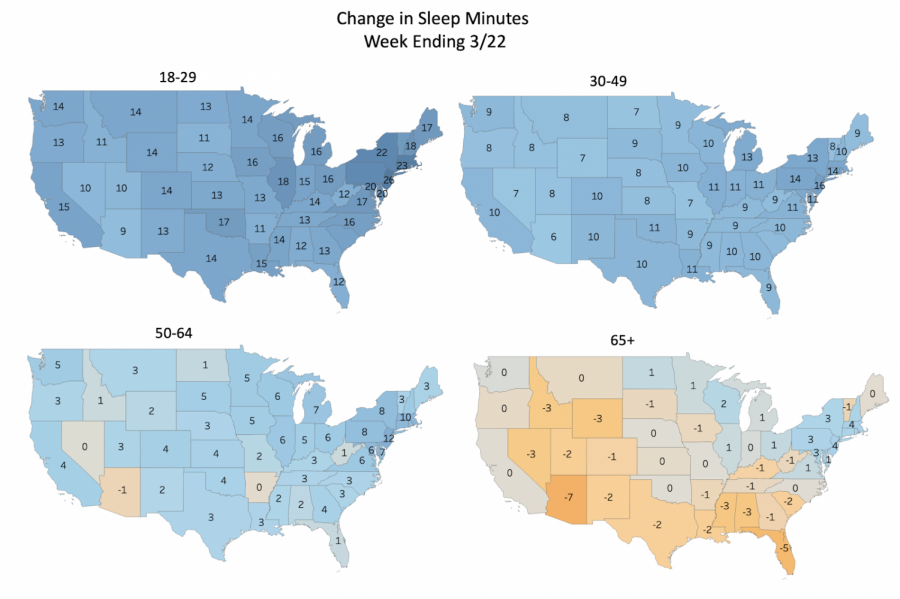Quarantined Night Owls
The pandemic’s impact on sleep is not limited to California; the image shows that sleeping schedules are changing drastically across the nation.
June 8, 2020
With California still in quarantine, people are looking for further notice on the stay-home order. Currently, only essential activity, retail, and necessary infrastructure are officially allowed in the state. (Covid19 CA Gov). Most of the population is still living under a new quarantine lifestyle, completely disrupting normal routines.
For many, a significant characteristic of quarantine is an extremely altered sleeping schedule.
According to CNBC, “time asleep increased 20%” and cases of “anxiety increased 49%” once President Trump declared a national emergency. These statistics are spurred by social and economic worries in light of the Coronavirus. As put by Tower, “The anxiety of living through a global health crisis,” along with an “increased flexibility within our daily schedules is changing sleep habits.”
Research has shown that stress over the current pandemic has had a direct link to an increase in cases of acute insomnia (Tower). General distress surrounding the pandemic is coupled with abrupt changes of routines in work or school.
In addition to stress, certain characteristics of quarantine lifestyle can further disturb a normal, diurnal sleep schedule. For example, increased screentime from online work/school will disrupt the release of “the body’s sleep-inducing hormone, melatonin” (National Sleep Foundation). Losing awareness of time and an increase in daytime naps has also delayed many sleeping schedules (National Sleep Foundation).
Still for others, quarantine allowed individuals to sleep whenever they wished. For Isabel Smith (9), “the first thing [she] thought when the principal announced quarantine was: ‘Yay more sleep!’”
Drastic changes in a sleeping schedule can greatly affect physical and mental health, so despite quarantine it is important to maintain healthy patterns. According to Sleep Foundation, sleep “empowers an effective immune system… heightens brain function… enhances mood… [and] improves mental health.”
For those individuals with a “…drastically change[d] sleeping schedule,” there are ways to salvage normal sleeping patterns (Isabel Smith). Scientific American recommends sticking to a consistent schedule by having a fixed bedtime and wake-up time. It also helps to “creat[e] an association in your mind between your bed and sleep,” by avoiding doing work or watching movies in bed; other methods include exposure to natural sunlight, avoiding long naps, exercising regularly, and keeping a healthy diet (Sleep Foundation).
Isabel Smith says she has been working to “control [her] sleeping schedule” using such methods; still, like many others, “[she] would definitely say that [she] is a natural night owl.”






















